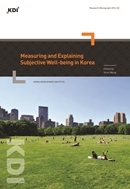Research Monograph Measuring and Explaining Subjective Well-being in Korea December 31, 2014

Series No. 2014-02
December 31, 2014
- Summary
-
Subjective well-being has attracted sharply increasing attention among researchers and policy makers in recent years. The public also pays a lot of attention to it, evidenced by the heavy use of the word “happiness” in media. Some researchers argue that subjective well-being measures should serve as important and reliable measures of human well-being, complementary to the more traditional, more material wellbeing measures such as Gross National Income (GNI). The World Happiness Report 2012 and 2013 strongly support the idea. The Organization for Economic Co-operation and Development (OECD) published Guidelines on Measuring Subjective Well-being in 2013 to help governments planning to measure subjective well-being, and to provide standards for how it is done. The Korean government seems to move in this direction: One of the main agenda of the government of Korea is to increase the happiness of each citizen. However, there is no comprehensive study on Korea’s subjective well-being to guide policy makers. For example, Korea is often labeled as an unhappy society, as reported by media and perceived by the public, based on some scattered evidence. Is it true? Existing studies do not provide a clear answer. This study is the first comprehensive investigation into subjective well-being in Korea. We aim to show a clearer and more complete picture of Korea’s subjective well-being, including its past and current status, its distribution over time, cohorts, and regions, and its determinants, based on the vast majority of available data. We then offer a few tentative policy suggestions. There are six chapters in this report. The main points are summarized as follows.
- Contents
-
Preface
Summary
CHAPTER 1
Measuring Subjective Well-being: Theory and Practice in Korea (John F. Helliwell and Shun Wang)
1. Introduction
2. How Can Subjective Well-being Be Measured?
3. Are Subjective Well-being Measures Reliable?
4. Can Subjective Well-being Research be Taken Seriously?
5. Measuring Subjective Well-being in Korea
6. Conclusions
References
CHAPTER 2
Korea’s Subjective Well-being in a Global Context (John F. Helliwell, Goh Eun Lee, and Shun Wang)
1. Introduction
2. Comparing Levels of Subjective Well-being around the World
3. Comparing Changes in Subjective Well-being during the Global Economic Crisis
4. Conclusions
References
CHAPTER 3
Life Satisfaction in Korea: Trends, Distributions, and Explanations (John F. Helliwell and Shun Wang)
1. Introduction
2. National Trend of Life Satisfaction
3. Distribution of Happiness by Age Group
4. Macroeconomic Dynamics and National Life Satisfaction
5. Regional Rankings and Trends of Life Satisfaction
6. Conclusions
References
CHAPTER 4
Determinants of Korean Happiness: A Cross-Sectional Analysis (Weina Zhou)
1. Introduction
2. Literature Review
3. Data
4. Estimation
5. Conclusions
References
CHAPTER 5
Rising Life Satisfaction in Korea: A Panel Data Analysis (Christopher P. Barrington-Leigh)
1. Life Course Overview: Life Satisfaction in a Rapidly-Changing Society
2. Changing Circumstances throughout the Life Course
3. Relative Weight of Domains
4. Private Tutoring
5. Geography, Gender Differences, Reference Effects, Education, and Labor Force
6. Conclusions
References
Appendix
CHAPTER 6
Life Policy Implications and Conclusion (Seulki Choi)
1. General Policy Suggestions from Happiness Studies
2. Policy Implications for South Korea
References
If you want to know more in detail?
- Key related materials
We reject unauthorized collection of email addresses posted on our website by using email address collecting programs or other technical devices. To access the email address, please type in the characters exactly as they appear in the box below.
Please enter the security code to prevent unauthorized information collection.
